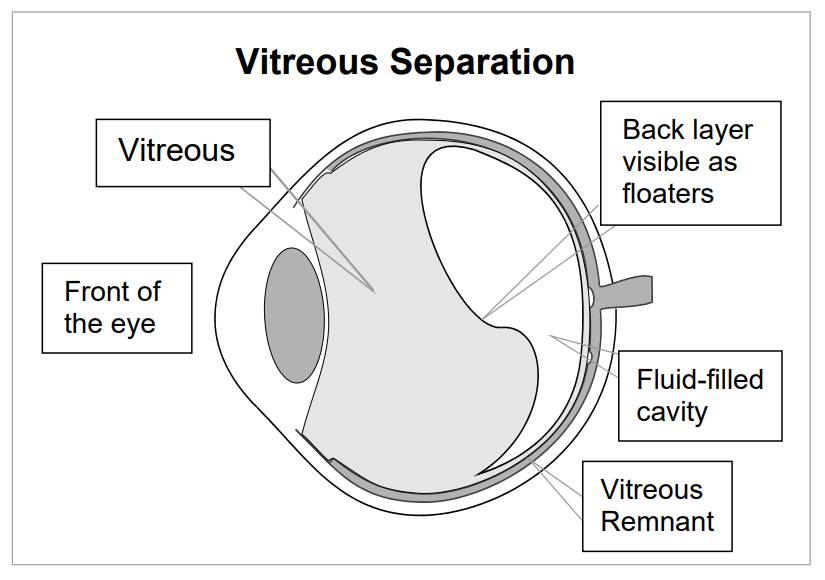Floater, Flashes and Vitreous Separation
Please note, this page is printable by selecting the normal print options on your computer.
The cavity of the eye is filled with a jelly like substance called vitreous. When we are young this jelly is attached firmly all around the retina so when the eye moves it moves with the eye. It is made up of fibres which are so fine that they don’t interrupt the light rays so you cannot see them. As we get older the fibres stick together and become visible. Spaces form in the jelly like pockets of fluid. When the eye moves the jelly doesn’t quite move at the same rate and this causes shadows to be seen which we describe as floaters.
Vitreous Separation

Sometimes the jelly peels away from the retina and the pattern of floaters changes or becomes much more noticeable. Occasionally the floaters can be so troublesome that they interfere with vision. The vitreous never separates completely from the front part of the retina. This can lead to tugging on the retina which we see as flashing lights like small streaks of lightning. If the jelly tugs very hard on the retina it may tear a hole especially if the retina is thin or the eyeball is big, for example a short sighted eye. If a blood vessel gets torn the eye will fill with blood which will cloud the vision. Occasionally a tear in the retina can lead to a retinal detachment.
A thin layer of vitreous may stay stuck to the retina. Rarely, this sheet can shrink and pull the retina into pleats or even tear a hole in the centre of the retina. The reason that you have been referred for examination is to make sure that if you have any retinal tears then these are treated before retinal detachment occurs.
Small holes are difficult to see, especially if the retina stays flat. So even if the doctor tells you that the retina looks good after the examination, if your vision starts to change or if you see a shadow coming in from the side of your vision like a purple curtain or the vision suddenly goes blurred and stays poor, you must arrange with your GP to have a check up as soon as possible either at the Milton Keynes Eye Unit Booked Emergency Clinic or at Stoke Mandeville Eye Unit Casualty.
The advice in this document is intended only as a guide for the benefit of patients. The exact details may vary from patient to patient depending on the individual’s condition. The details are in line with current views in ophthalmology.
